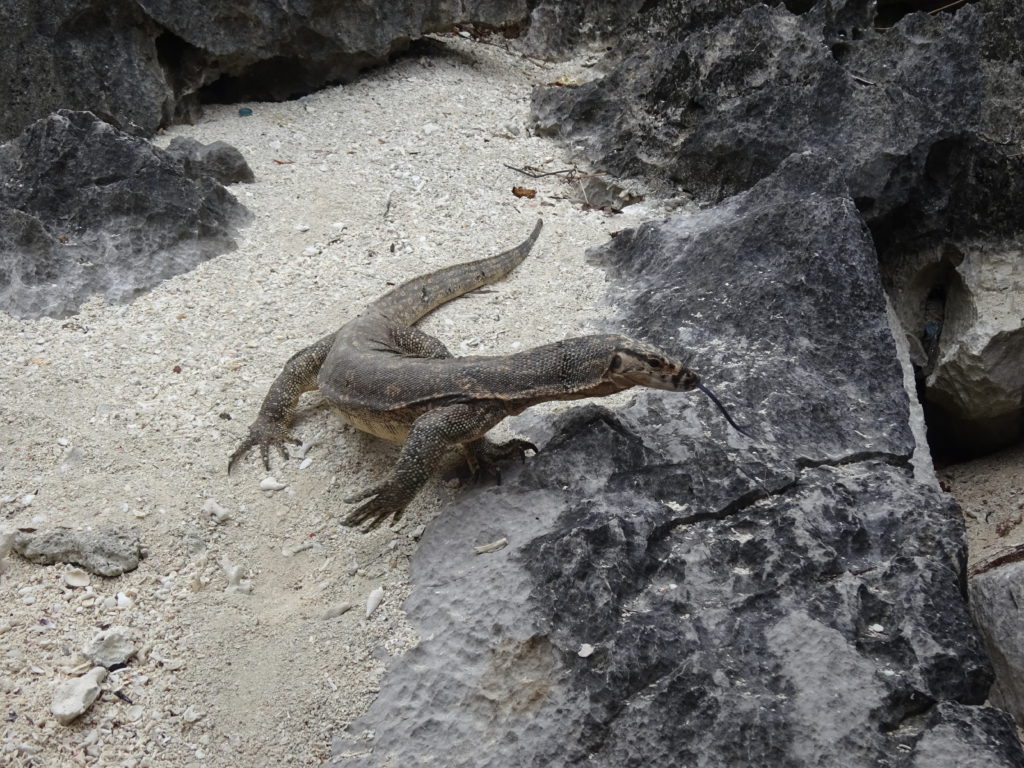The monitor lizard was six feet long from nose to tail, maybe even longer. We were in the Philippines, and we were all staring at it.
 A close relative of the somewhat larger and more famous Komodo Dragon, all monitor lizards belong to the genus Varanus, a word derived from the Arabic meaning “dragon” or my favorite, “lizard beast.” And what a beast he was (but in a good way).
A close relative of the somewhat larger and more famous Komodo Dragon, all monitor lizards belong to the genus Varanus, a word derived from the Arabic meaning “dragon” or my favorite, “lizard beast.” And what a beast he was (but in a good way).
On our recent tour through several Philippine islands we made a stop at Coron, which consists of a couple of big islands and around 50 other islets. The day was spent snorkeling both in Kayangan Lake, a mixed fresh and salt water body of water, and a tropical reef filled with fishes and corals. For lunch we took the outrigger to another part of the island for a nice beach picnic.
Perhaps that is what attracted the monitor.
After eating we noticed some rasping sounds behind us and suddenly there was this lizard, its tongue flicking out repeatedly in search for food. Virtually all monitor lizards are primarily carnivorous, although there are three arboreal (tree climbing) species in the Philippines that are fruit eaters. This one was not arboreal but strutting along the rocky gravel and sand looking for food. It may have smelled the crabs and fish and other delicacies we had just barbecued up, or maybe it was looking for other reptiles or amphibians…or even birds and small mammals. I’m suddenly reminded that humans are mammals and wondering what monitor lizards consider “small.”
This particular one graced our presence for about 20 minutes or so. At one point a stray cat – feral cats are everywhere in the Philippines – engaged in its own stare down with the monitor from a relatively safe rocky perch. We could tell the monitor was thinking about it, but then suddenly, a semi-feral dog raced into the scene and leaped onto the back of the monitor, which quickly shed its unwanted rider and sped into the crevices of the nearby rocks. The cat also jumped a mile in the air from the sudden intrusion and took off into the forest. Whether the dog was rescuing the cat or simply felt ignored by all the people gazing at the monitor is unclear, but after about 10 minutes searching fruitlessly for the lizard among the rocks, it slowly made its way back to the beach.
And so ended our monitor moment. This was the first monitor lizard seen on the trip, but not the last. A day later another was wondering near our stop off for the underground river on the Philippine island of Palawan. Then we spotted another in the mangrove forest of Brunei (where we also saw a proboscis monkey, but more on the monkeys later). Monitor lizards are oviparous, meaning they lay eggs, as few as seven and as many as three dozen at a time. We didn’t see any nests, but there is plenty more to talk about so look for future posts on monitors and other Philippine flora and fauna.

Lincoln: The Fire of Genius: How Abraham Lincoln’s Commitment to Science and Technology Helped Modernize America is available at booksellers nationwide.
Limited signed copies are available via this website. The book also listed on Goodreads, the database where I keep track of my reading. Click on the “Want to Read” button to put it on your reading list. Please leave a review on Goodreads and Amazon if you like the book.
You also follow my author page on Facebook.
David J. Kent is President of the Lincoln Group of DC and the author of Lincoln: The Fire of Genius: How Abraham Lincoln’s Commitment to Science and Technology Helped Modernize America and Lincoln: The Man Who Saved America.
His previous books include Tesla: The Wizard of Electricity and Edison: The Inventor of the Modern World and two specialty e-books: Nikola Tesla: Renewable Energy Ahead of Its Time and Abraham Lincoln and Nikola Tesla: Connected by Fate.










